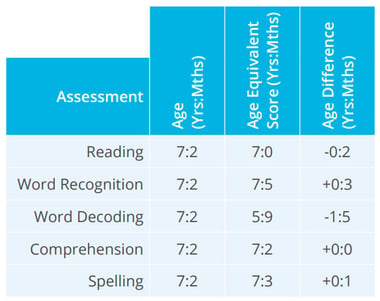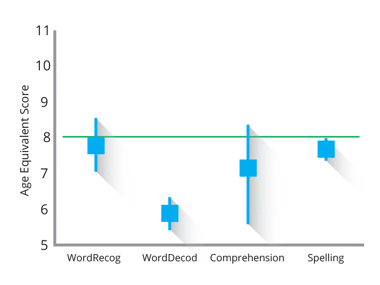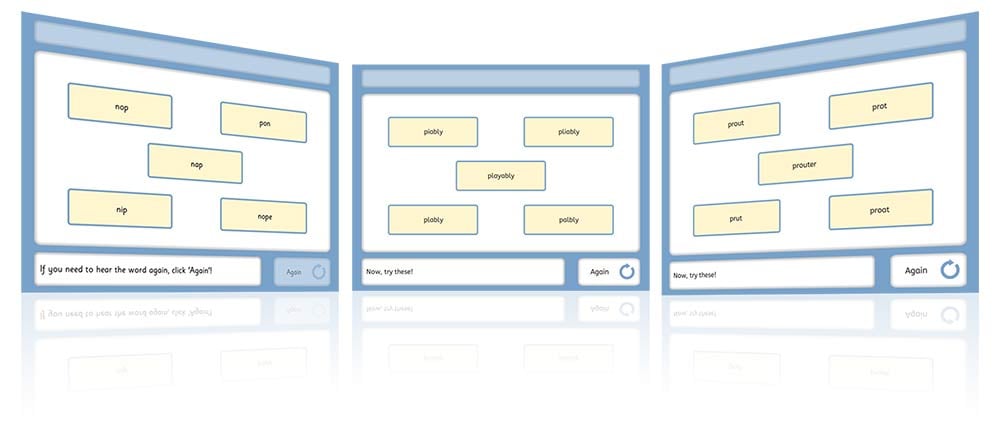Case Studies and testimonials / Lily
Lily
Using InCAS to improve Reading
(InCAS has now evolved into Cambridge Primary Insight)
Find out more.
Identifying common reading problems with InCAS
Lily is 7 years old and in Year 2 of a large primary school in the north of England. She is open and sociable, and likes to help other children with their work. Her favourite subject is Maths, and she especially likes measuring things and drawing graphs. Her mother is a teacher and Lily, too, has said that she wants to be a teacher when she grows up.
Lily’s school uses CEM’s InCAS assessment (now evolved into Cambridge Primary Insight) each year to provide a unique profile for each pupil and to measure the progress they make.
InCAS is a personalised computer-adaptive assessment, tailored to each individual pupil according to their age and abilities, generating an age equivalent score (the age that the child is actually working at). InCAS measures Reading, Maths, Spelling, Mental Arithmetic and Developed Ability, but also provides a breakdown of scores from each section, enabling teachers to establish each pupil’s strengths and areas for development.
InCAS feedback for the whole class is also available in table and chart formats, enabling easy comparisons between pupils, classes and cohorts to be made.”

Identifying unusual patterns
Lily was assessed using InCAS in November and, although her results were generally as expected, her teacher noticed an unusual pattern in her Reading assessment results.
The InCAS Reading module evaluates skills in:
- Word Recognition
- Word Decoding
- Comprehension
The scores of each section of the reading module are displayed on one chart, allowing a direct comparison of her scores.
The feedback from these assessments provides a holistic profile of Lily’s strengths and learning needs. Lily’s teacher is able to use the feedback to adapt her teaching and learning activities and ensure Lily’s skills develop over time.
InCAS feedback for the whole class is also available in table and chart formats, enabling easy comparisons between pupils, classes and cohorts to be made.
Supporting word decoding
By examining the Age Difference column Lily’s teachers noticed that, although Lily’s overall Reading scores are generally around her chronological age, her Word Decoding score is very low, and is nearly a year and a half below her chronological age.
It is recognised that a child’s reading comprehension is underpinned by two key skills: decoding and listening comprehension.
Decoding begins with children learning some letters of the alphabet and recognising a few simple words. Teaching children phonics also provides the means to understand the words they don’t know immediately. Thus children become able to read new words using both recognition and decoding strategies.

The Word Decoding section of the InCAS assessment presents pupils with a spoken word they normally haven’t heard before (many are nonsense or ‘pseudo’ words), and asks them to pick the most likely spelling of the word they heard from five choices displayed on the screen.

Common reading problems
Lily’s low Word Decoding score indicates that she is unable to distinguish the correct spelling from the alternatives offered, and that this is a consistent issue.
It is common to see this pattern. Children with scores like these are likely to be associating the spoken word with the written word without considering the sounds the individual letters in the word make. Using this technique they are able to build a large sight vocabulary of common words, enabling them to read with a high degree of fluency but it does not provide them with a strategy for reading unfamiliar words.
Lily’s Word Recognition score which is a little over her chronological age, provides further proof that she has no issues recognising words with which she is already familiar.

Next Steps
For children who have difficulties decoding text, phonics-based programmes and training in phonological awareness have been found to be particularly effective.
Lily’s teacher finds that when asked to ‘sound out words’ she becomes frustrated and she often guesses at words based on the first letter or two.
Now that the Lily’s teacher has identified the particular strand affecting Lily’s reading, she can support her and develop her word decoding skills with a range of activities, such as:
- ‘Look, Read, Cover, Say, Check’
- Simple word games such as matching, snap or word bingo
- Teaching phonics in a systematic and explicit way.
- Use manipulatives to help teach lettersound relationships. These can include counters, sound boxes, and magnetic letters.

